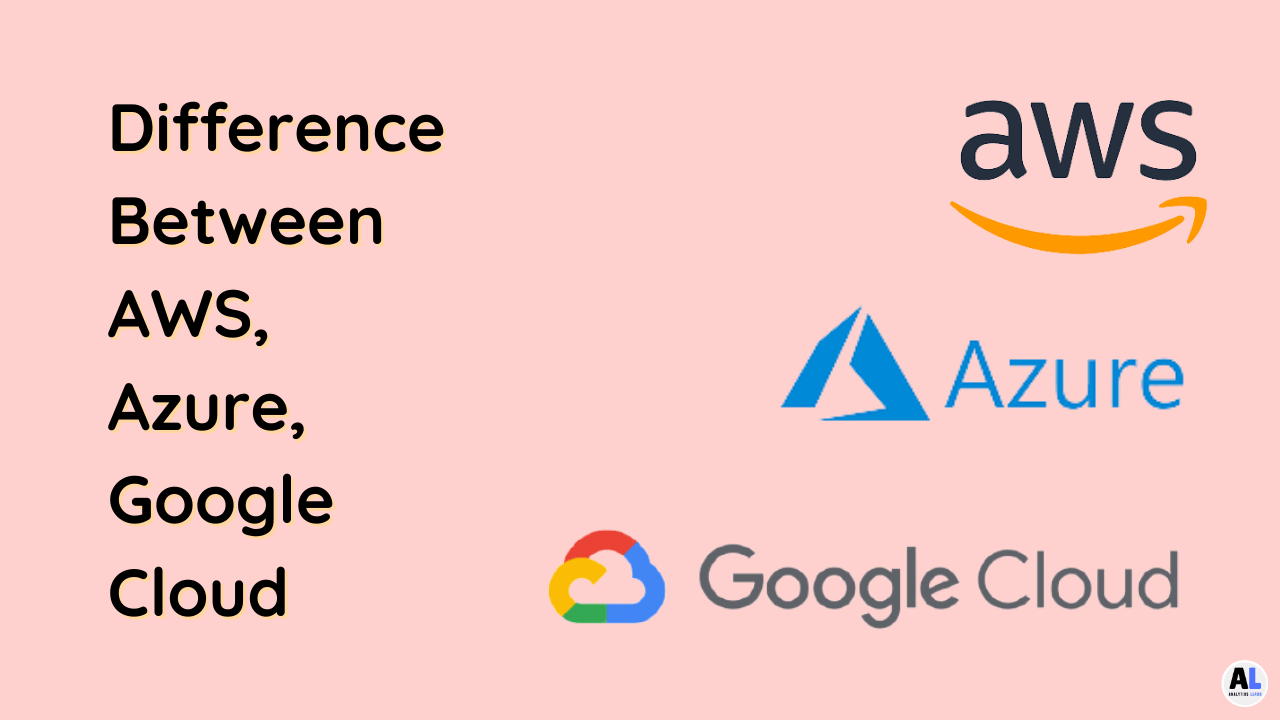We will explore the detailed use of different clouds in today’s market and also going to see the differences between AWS vs azure vs google cloud, the top cloud providers.
There is not only one player in cloud computing or for cloud operation. In fact, there are many, many companies providing robust solutions for the cloud.
It can honestly get a little confusing sometimes trying to understand the differences between them to make an informed decision.
AWS Vs Azure

In this section, I thought it would be good to talk about some of the more popular competitors and the differences between them and AWS.
Now let’s understand about Microsoft Azure, Both companies residing in the Seattle area only makes the competition between them that much more fierce.
The Azure framework was started by Microsoft in around 2010 as the cloud became a major player in computing.
The general structure and the model of Microsoft Azure is mostly kind of similar to AWS and it provides a range of computing services with on‑demand scalability and flexible pricing.
Speaking of pricing, it can be difficult when comparing pricing between the two services since they don’t offer the exact same-sized offerings.
It does appear that Amazon’s pricing is more competitive, but that really shouldn’t be the main factor when deciding on a computing platform, especially since the pricing is close enough between the two.
Key differences between Azure and AWS
1. Diverse Functionalities
In the past few years, Azure has takeover AWS in terms of cloud service offerings, several types of data engineering functionality, and global reach.
There is not much difference between AWS and Azure, only the Microsoft products like Windows Server, analytics tools, and SQL Server you can access directly in Azure only.
AWS is utilized for website and web application development work while Azure is very good at Data Engineering operations.
2. Azure Adding more Services and Choises
As per a recent announcement from Microsoft, it is removing the option for customers to migrate their licenses for these services to competitor clouds.
This may indicate that Microsoft is likely to begin consolidating their products onto Azure, making it the easiest and cheapest place to run these products.
As per this view, if you currently use or looking to use Microsoft products in the cloud, Azure is probably the best provider to use.
3. Interfaces Are Different
On the other hand, I have seen while working in AWS and Azure both consoles it is quite different.
Perhaps it’s just that I’m extremely familiar with AWS’s UI. But I’ve found Azure’s interface to feel much more cluttered as they try to provide a more unified experience with all their available services.
Navigating the AWS console does require more clicks because each service has its own dashboard portal, but I actually prefer that over Azure’s approach.
Now all these are my personal preference, so you can try both out and see which is good for you based on your business need can choose.
AWS vs Azure vs Google Cloud

In Gartner’s 2019 report, they have shown Google Cloud, sometimes called Google Cloud Platform, to the leader section, joining AWS and Azure.
It’s a big part for Google as they continue to grow their market share, attempting to take the third-place spot from Alibaba Cloud.
So let’s take a closer look at Google Cloud. Google unveiled its first cloud offering, App Engine, in 2008 and released it to the public in 2011.
Since that time, they’ve added more services and consolidated them into a single cloud platform offering to make it more diversified.
While there does seem to be some specialization in the big data, AI, and Kubernetes spaces, it’s hard to see the real differentiators between AWS and Google Cloud.
Their data reach and locations seem similar and the market share of AWS does dwarf Google’s at this point, and I think the Google Cloud web console needs some more time to mature.
As Google Cloud grows, it should be interesting to see how they differentiate themselves from AWS and Azure.
Other Cloud Providers
There are other cloud service providers in the market which also have different types of usability like Salesforce, Alibaba Cloud, SAP, IBM Cloud, Oracle, Rackspace Cloud, VMWare, etc.
There is also a new cloud system that is getting more popular for startups is Heroku and it is originally started as a cloud computing platform for Ruby on Rails applications back in 2007.
Other cloud providers and their services do not offer many functionalities like Azure, Google Cloud, and Amazon Web Services options, and their global reach is limited as compared to AWS, Azure, and Google cloud.
Conclusion
To conclude, the usability of cloud systems is exponentially growing day by day because of the large amount of data generation and internet penetration.
In the market there are several cloud providers are available now but the AWS, Azure, and Google cloud are much well known because of more functionality and their low cost.
There are other trust factors and data security-related norms that are highly maintained by this cloud services providing organization that makes them more usable in the market.
Recommended Articles:
What Is Cloud Computing? – Example, Components, Platforms
What Are The Components Of AWS Global Infrastructure?
What Is A Virtual Private Cloud In AWS?
What Are The Data Lakes? – Architecture, Usecases

Presenting the Data Engineer Team, a dedicated group of IT professionals who serve as valuable contributors to analyticslearn.com as authors. Comprising skilled data engineers, this team consists of adept technical writers specializing in various data engineering tools and technologies. Their collective mission is to foster a more skillful community for Data Engineers and learners alike. Join us as we delve into insightful content curated by this proficient team, aimed at enriching your knowledge and expertise in the realm of data engineering.










